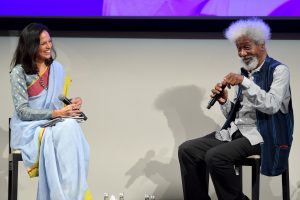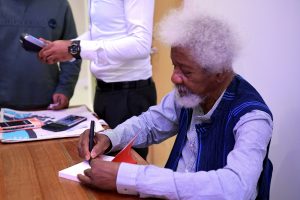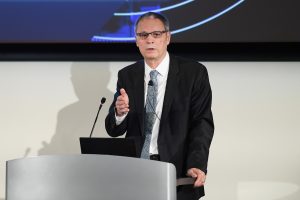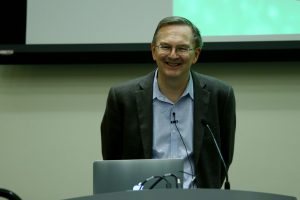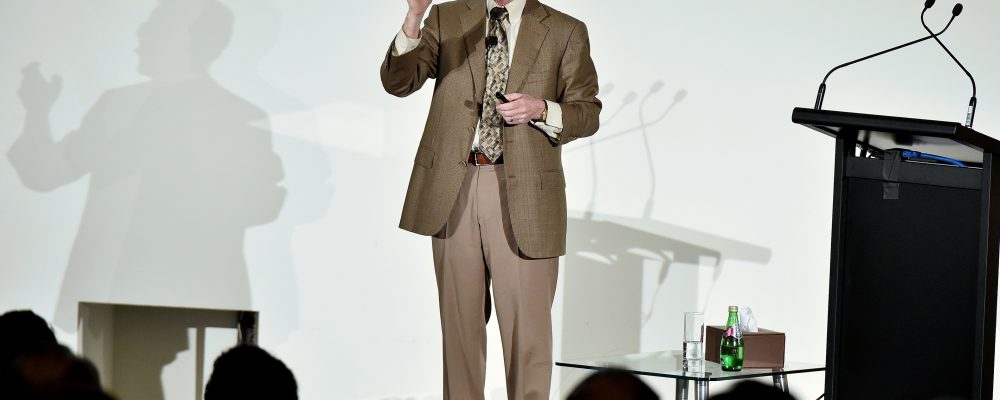The NYU Abu Dhabi (NYUAD) Institute has launched an online Nobel Laureate Lecture Series, featuring six past lectures given by Nobel Laureates at The Institute. The series, available on The Institute’s YouTube channel, aims to connect audiences with leading thinkers and speakers from the comfort of their homes.
As members of the community practice physical distancing this Ramadan, they are invited to delve into topics that include how electricity powers our muscles, attempting to understand the origin of cellular life, and the implications of artificial intelligence on society and economics.
Speaking on the launch of the series, Director of Public Programming at The Institute Philip Kennedy commented: “The Institute is very keen to sustain the atmosphere of community and communication that it has built up over ten years, and some, of public lectures. Of course, we miss enormously the personal contact of our normal and regular get-togethers, and the chance they have always given us to meet each other, to encounter new colleagues with the opportunity of discussing the invariably important subjects of any given lecture. How should we respond and react? Well, total silence and separation is unbearable, we need more than ever to feel the presence of others with the means available to us.”
He added: “The Institute has assessed how much it has to share from past years, to unveil a truly rich archive of recordings, both of lectures and panel discussions, and now is really the ideal time to make these available. To offer, as others are keen to do also, intellectual diversion from the morbidity that otherwise possesses the airwaves, we have started with a series of six lectures by Nobel laureates. It is a thrill to rediscover any and all of our past events, but especially satisfying to recall the eminent stature of those speakers and researchers who have visited us.”
The Nobel Laureate Lecture Series includes the following talks:
The American biophysicist, Roderick MacKinnon, who won a Nobel Prize in Chemistry in 2003 for his work on ion channels’ structure and operation, is available to listen to as he speaks on how electricity informs life. Within his lecture, MacKinnon discusses the concept and the history of ‘animal electricity’, and as to how electrical impulses transmit information to our muscular motions.
Speaker
Roderick MacKinnon, Nobel Laureate; Professor of Molecular Neurobiology and Biophysics, Rockefeller University
The 1986 Nobel Prize in Literature winner Wole Soyinka is a Nigerian playwright, poet, and political activist. Born in 1934, he is considered among contemporary Africa’s greatest writers and a global artist and scholar. Soyinka has published more than 90 works and remains active in international, artistic, and human rights organizations. In this conversation, he reflects on culture and tradition, creativity and power, as well as activism and the artistic process. He ruminates on ‘Renaissance Next Time? Africa at the Crossroads’ exploring the themes of the world in Africa and Africa in the world.
Speaker
Wole Soyinka, Nobel Laureate in Literature
In conversation with
TishaniDoshi, Visiting Assistant Professor of Practice, Literature and Creative Writing, NYUAD
Human cells export thousands of different form of proteins, and this process is the topic of concern for the American cell biologist, Randy Schekman, who won the Nobel Prize in Physiology or Medicine in 2013. Schekman explores the applications of the export of proteins, an ancient biological process, in understanding how we can develop modern medicine further.
Speaker
Randy Schekman, Nobel Laureate; Investigator, Howard Hughes Medical Institute; Professor of Cell and Developmental Biology, US Berkeley
The question of how the very first cellular organisms came into existence is a profound inquiry about the very nature of life itself. Nobel prize winning biologist, Jack Szostak, discusses his work in trying to ‘reverse engineer’ such a process by designing and building very simple living cells, and presenting what the implications are of that process for understanding life as we know it.
Speaker
Jack Szostak, Nobel Laureate; Professor of Genetics, Harvard Medical School
The macroeconomist, Thomas J. Sargent, who won a Nobel Prize for his work on cause and effect in the macro-economy in 2011, presents a history of American tariff and trade policies, since the foundation of the country in 1776 to the present day. In the talk, he discusses what the historical impacts of such policies were, and how the use of tariffs have shifted in American economic policy over the past 240 years.
Speaker
Thomas J.Sargent, Nobel Laureate; Professor of Economics, NYU
The final talk available in the series is from French economist, Jean Tirole, who won a Nobel Memorial Prize in 2014. In his lecture, Tirole discusses the corollary between the application of artificial intelligence and its implications on public policy, particularly focusing on existing socio-economic challenges and how AI will impact on them.
Speaker
Jean Tirole, Nobel Laureate; Chairman of the Executive Committee, Institute for Advanced Study in Toulouse (IAST)
The NYUAD Institute has made a range of its previous talks and lectures available to view during the outbreak of COVID-19, offering intellectual distraction and nourishment for audiences across the globe. The NYUAD Institute’s YouTube channel, containing hundreds of lectures on a wide variety of topics including history, the sciences, the Arabian Gulf, and others, can be viewed here.
